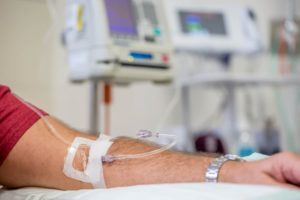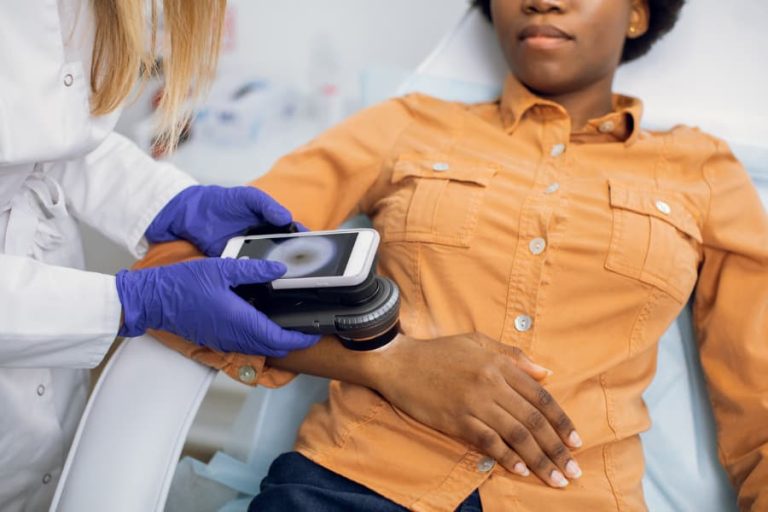
What Is Immunotherapy – and Is It Right for You?
If you or a loved one has been diagnosed with cancer, doctors can choose from many treatments to provide the best care possible for each
HIPAA Alert: Potential Data Breach Learn More
Questions on Oncology, Hematology and/or Infusion Clinical Services due to COVID-19 Crisis – CALL 833-698-1623
Important Information for Our Patients Regarding the Coronavirus.
RCCA Providing Area Cancer Patients with Access to Care During Coronavirus Outbreak
RCCA Offering Patients Virtual Visits During Coronavirus Pandemic
It is very important for physicians to determine the stage of a melanoma or other skin cancer to decide how best to treat it. The medical oncologists of Regional Cancer Care Associates (RCCA) have extensive experience in staging melanoma and advanced forms of other skin cancers and then formulating and implementing individualized treatment plans. RCCA cancer specialists provide the latest therapies for solid tumors, blood-based malignancies, and benign hematological conditions at more than 20 conveniently located community-based care centers in Connecticut, Maryland, New Jersey, and the Washington, D.C., area.
The three most common skin cancers are squamous cell carcinoma, basal cell carcinoma, and melanoma. Each develops from irregular cell growth in a particular part of the skin’s topmost layer, the epidermis.
Squamous cell carcinoma occurs in the squamous cells situated at the skin’s surface, or epidermis. This kind of carcinoma is slow-growing and accounts for about 20% of all skin cancer diagnoses. Basal cells are round and located just under the squamous cells. Basal cell carcinoma is the most prevalent kind of skin cancer. It also grows slowly and is easy to detect, making it highly treatable.
Melanoma is a cancer of melanocytes, cells located at the bottom of the epidermis and close to the skin’s nerves. This form of skin cancer mutates and metastasizes quickly. As a result, melanoma is responsible for most skin cancer deaths. However, it is highly treatable, particularly in its early stages.

The five-tiered cancer staging method for melanoma helps patients understand the severity of the cancer and enables physicians to develop an individualized treatment plan. The stages, ranging from 0-IV, indicate the location and spread – if any – of the cancer.
Squamous and basal cell carcinomas do not have staging because they are highly treatable and rarely grow or spread to other parts of the body. The stages for melanoma are:
When detected and treated within the first stages, melanoma has a five-year relative survival rate of 99%. This statistic drops to 68% if treated when it has entered the lymphatic system. That is why regular skin self-examinations and periodic examination by a primary care provider or dermatologist are crucial.
Patients may also develop other, rarer forms of skin cancer, including Merkel cell sarcoma and Kaposi sarcoma. Like melanoma, these forms of skin cancer are fast-spreading.
Skin cancer can manifest on the epidermis in many ways. The following are some signs to note and bring to a doctor’s attention:
Cancer experts also recommend using the ABCDE method when performing skin self-examinations. These letters stand for:
Patients noting any of these signs should visit their primary care doctor or dermatologist for professional evaluation of the mole or skin lesion.
The biggest risk factor for skin cancer is exposure to ultraviolet (UV) rays via the sun or tanning beds. Medical professionals recommend avoiding prolonged exposure to the sun, especially during peak daylight hours. Additionally, regular use of sunblock and clothing can reduce the risk of developing skin cancer. Studies show that experiencing as few as five sunburns doubles the chance of melanoma developing.
Several personal characteristics also increase the risk of developing skin cancer. These include having:
It is important to note that people with darker skin color and hair tones are also susceptible to skin cancer, and that regular medical skin screenings are crucial for early detection and treatment of skin cancer.
Depending on the extent of the disease and other factors, patients may have multiple treatment options for skin cancer, including:
Different types of surgery, including Mohs micrographic surgery,, can be highly effective for excising skin cancer.
This is a non-invasive form of treatment that often is used on benign and malignant tumors. It employs liquid nitrogen to freeze off cancerous cells. Cryotherapy typically heals evenly without forming scars.
Radiation therapy generally is reserved for use in later stages of skin cancer and often is delivered in combination with other therapies. It destroys cancer with high-energy wave devices.
Chemotherapy uses toxic drugs to kill cancer cells. Patients receive these treatments intravenously, by injection into specific areas of the body, or by swallowing pills or liquids taken by mouth.
Targeted therapy is similar to chemotherapy, and is a fairly new approach. As their name implies, targeted therapies act against specific mutations driving cancer growth, and so have an effect only on cells with these mutations rather than on nearby healthy cells.
Immunotherapies harness the power of the body’s own immune system to identify and attack cancerous cells. Immunotherapy has become a prominent component of the treatment plan for advanced melanoma in recent years.
A physician may recommend curettage and photodynamic therapy to eliminate cancerous cells in some patients, as well as clinical trials. It all depends on the specific type of skin cancer the patient has and how far it has advanced.
Patients with melanoma or advanced forms of other skin cancer can depend on the specialists at Regional Cancer Care Associates to guide them through treatment options that meet their specific needs. With more than 20 community-based care centers throughout New Jersey, Connecticut, Maryland, and the Washington, D.C., area, patients can obtain expert and compassionate care for cancer and blood disorders in convenient settings close to home. Contact one of these locations to learn more about skin cancer types today.
From empowering you with information and tools to fully understand skin cancer, to treating it quickly and comprehensively, RCCA is committed to your care. As one of the nation’s largest cancer physician networks, we have the reach, the resources and the localized accessibility to treat your very individualized needs with top-quality care and unfailing compassion.
For more information, or to schedule an appointment, call (844) 346-7222. You can also schedule an appointment by calling the RCCA location nearest you.

If you or a loved one has been diagnosed with cancer, doctors can choose from many treatments to provide the best care possible for each

Share on facebook Share on twitter Share on linkedin Share on email Share on print The New Jersey average of 22.2 new cases of melanoma

East Coast residents are no strangers to winter weather, and those long, chilly months tend to make time under the summer sun that much more appealing.
When standard cancer treatments aren’t providing the results you want, clinical trials may offer hope. Our physicians use clinical trials to study new treatments, helping transform cancer care for the better. You can enroll in a clinical trial to try groundbreaking treatment plans at zero cost to you.

Regional Cancer Care Associates is one of fewer than 200 medical practices in the country selected to participate in the Oncology Care Model (OCM); a recent Medicare initiative aimed at improving care coordination and access to and quality of care for Medicare beneficiaries undergoing chemotherapy treatment.